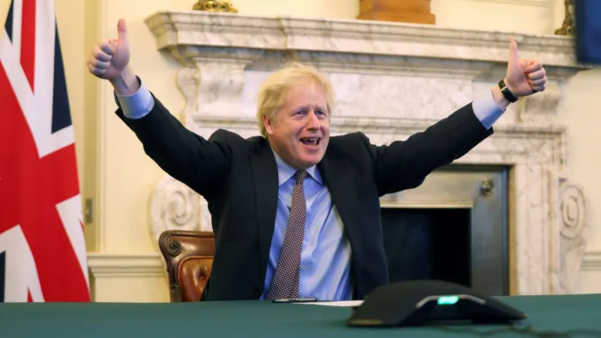Input 2020.12.25 12:54 | Revision 2020.12.25 12:56
There is no product tariff or quota, but the corporate burden is 8 trillion ↑
The financial services sector that the UK is making a surplus should not be included in the deal.
“Trump cheered Brexit, backslidden to Biden’s era” concerns
The UK is lighter, so the possibility of signing an FTA with the US is low
The UK will withdraw from the EU single market and customs alliance from next year after a one-year transition period. A completely different world unfolds from now when people, goods and services were guaranteed free movement. The world is paying attention to whether the UK’s post-globalization experiment will succeed in the midst of the economic protectionism craze.
On the 24th (local time), the British government and the European Union (EU) concluded negotiations on future relations. ▲ Tariff-free and quota-free trade in goods (quota, production limit) ▲ End of free movement benefits within EU member states ▲ The gradual reduction of EU countries’ fishing rights in the UK waters is the main focus. After approval by the British Parliament, EU member states and the European Parliament, it will take effect on January 1 of next year.

The Wall Street Journal (WSJ) compared the agreement as a rare, real-time post-globalization experiment and diagnosed that it would lead to more serious trade friction than it is now. Since the 1990s, when globalization became a trend with the launch of the World Trade Organization (WTO), it is expected to remain the first case in which major countries declared their separation from economic alliances.
◇ UK divorced from EU, what will be different
According to the WSJ, the British Financial Times (FT) and CNN, according to the agreement, the UK will withdraw from the EU single market and customs alliance next year, but imports and exports of goods with the EU are non-tariff and quota-free as they are now. However, in order to continue to be subject to no tariffs, the UK government must comply with the same labor environment regulations and subsidy policies as the EU.
This means that the UK will be treated better than advanced countries such as the United States and Canada, which are not EU member states, but the addition of customs documents increases the burden of time and money on British companies and individuals. The British government estimates that the number of filing documents that companies must submit will increase by 215 million per year, and that they will have to pay an additional $7.5 billion (8.3 trillion won).

The issue of fishing rights, which made it difficult to conclude negotiations until the last minute, decided to allow the UK to catch fishing by EU member states for the next five and a half years, subject to lower catches than its own. At the end of the transition period, the UK will negotiate annual fishing rights with the EU.
Attorneys, accountants, flight controllers and pilots who have acquired professional qualifications in the UK are now recognized for the same qualifications in the EU, but will be recognized only within the UK from next year.
◇ British, financial hub’at stake’… “Back to Biden’s Era” Cadastral Map
Experts predict that the UK has avoided the worst-case scenario of a no-deal Brexit, but still has problems to be solved. JPMorgan’s Malcolm Bar said in a report that “the EU has been given the ability to selectively regulate its trade relations with the UK, while retaining most of its existing trade advantages.”
The biggest problem is that the UK will withdraw from the EU’s single financial services market. The UK is the world’s number one financial services exporter, with a trade surplus of £79 billion (119 trillion won) last year. The two sides did not include the field of financial services in future relations agreements and decided to discuss them through separate consultations.
From next year, British financial institutions, like non-EU member states,
Separate permission is required. In preparation for Brexit, many financial institutions have obtained temporary equivalence rights from the EU to conduct certain business activities, but the scope of possible business activities is expected to be significantly reduced compared to that of EU member states.
If the UK’s financial hub status weakens, some EU member states are expected to benefit. After the Brexit vote in 2016, 7500 jobs in the UK have been transferred to Germany, France, the Netherlands and Ireland, and it is estimated that £1.22 trillion in assets (1800 trillion won) have been lost.

On the other hand, there is also a positive view that the UK’s rather lighter body is able to create a different kind of economic partnership with the Biden administration and the existing Free Trade Agreement (FTA). The New York Times (NYT) reported that even within the EU, China’s strategy could be devoted to policy decisions that thoroughly reflected its own interests in a situation where internal divisions became severe.
